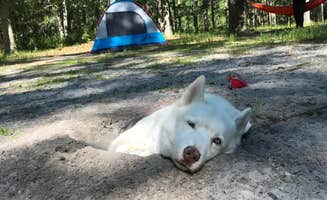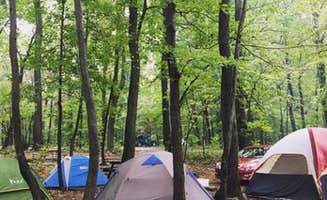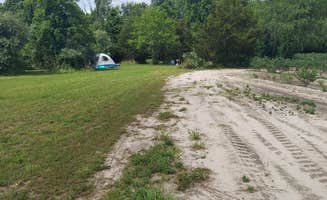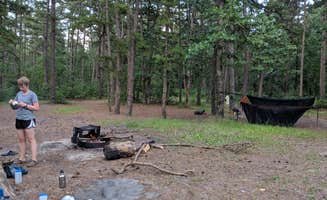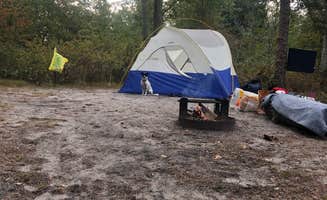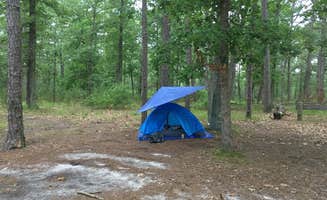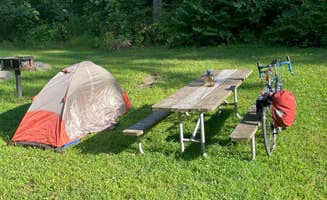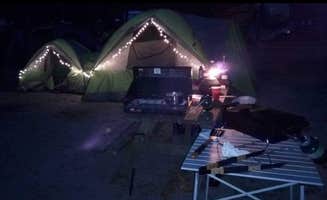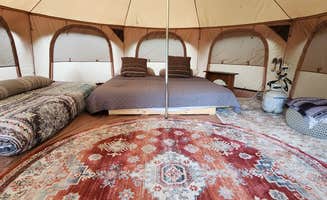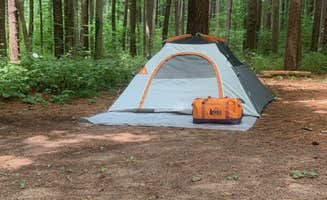Tent campsites near Camden, New Jersey cluster primarily in state forests and parks within 40 miles of the city. Most sites feature basic amenities with the Pine Barrens region offering the greatest concentration of primitive camping opportunities. Seasonal operation typically runs April through October, with many locations requiring advance reservations through the New Jersey State Parks system.
What to do
Birdwatching at hawk observation decks: Fort Washington State Park provides excellent raptor viewing opportunities from its designated observation platform. "There's 3.5 miles of trails leading to Hawk Watch observation decks, which birders will marvel at and the rest of us will simply appreciate the vista," notes one camper at Fort Washington State Park.
Kayak access to remote sites: Several campgrounds offer water-based entry points for paddlers seeking more remote experiences. At Round Valley Recreation Area, a camper explains, "If you get a site on the water, you can take a boat across to your site. In-season rentals should be available on-site." The reservoir provides crystal clear water, though swimming restrictions apply at designated campsites.
Historical exploration: Washington Crossing State Park connects camping with Revolutionary War history. "Visit the park's historic reenactments, especially the Christmas Day Crossing event as it's easily the most memorable history lesson you'll ever get outdoors," reports a visitor to the park. The surrounding area features historical buildings, museums, and interpretive trails.
What campers like
Pine forest isolation: The dense Pine Barrens ecosystem creates natural privacy barriers between many sites. "Located in the middle of the pine barrens, it is so easy to get lost in these woods and I LOVE IT! If you want off the beaten path and not close to anyone... this is IT!" writes a camper at Batona Campground in Wharton State Forest.
Easy trail access: Many campsites connect directly to hiking trail networks. "Best part of this campground is trailheads begin directly from campsites. Trails vary in length but all are flat and easily accessible," explains a reviewer at Batona Campground. These interconnected trails allow campers to explore without needing transportation.
Minimal light pollution: The relative distance from urban areas provides darker night skies than typical suburban settings. A Round Valley camper shares, "Beautiful and quaint..a nice place to get away and enjoy some nature." The lack of electrical hookups at most tent sites helps preserve the natural darkness for stargazing.
What you should know
Access challenges for some sites: Several campgrounds require significant hiking or boat access. At Round Valley, "It's a pretty strenuous hike, but you'll be rewarded for the effort!" One camper cautions, "I have hiked throughout the entire US and consider myself somewhere between a moderate to skilled hiker and I found these trails challenging and uneven."
Insect prevention essential: The wooded environment supports active tick populations. "Just gotta check often for chiggers and ticks," warns a visitor to Goshen Pond Campground. Long pants, insect repellent, and daily tick checks are necessary precautions, especially during summer months.
Limited water availability: Many sites lack running water. "We found one running spigot of water up here, but it was so gross we didn't use it," reports a camper at Tinicum Island. Bringing sufficient water or reliable filtration systems is essential when visiting more primitive sites.
Tips for camping with families
Start with accessible sites: Begin with drive-in options before attempting hike-in locations. "This place is great for first time campers," mentions a visitor to Ridley Creek State Park, noting the "nice open field with two sites and two fire pits. They also have a tone of trails to hike on."
Wildlife viewing opportunities: Many parks feature diverse ecosystems ideal for nature education. At Evansburg State Park, a parent shares, "Since he was 2 years old I've taken my son, and we always have an amazing time, either hiking the trails to wandering in the woods looking for adventures."
Plan for mud: Seasonal conditions can create challenging terrain for children. "I find Evansburg to be the muddiest State Park I've ever experienced; I always bring a pair of sneakers to change out of my hiking boots, as well as shoes and change of clothes for the little guy," advises a regular visitor to Evansburg State Park.
Tips from RVers
Size restrictions limit options: Most tent-focused campgrounds cannot accommodate larger rigs. "The unpaved road into the site is narrow and tree lined. A larger RV would not fit," cautions a reviewer about Batona Campground. RV camping options are significantly more limited than tent sites in this region.
Consider group facilities: Some parks offer specialized group camping areas that can accommodate small RVs. "Fort Washington campground is located smack dab in the middle of five nearby hamlets," notes a visitor, who recommends exploring the surrounding towns for amenities not available within park boundaries.
Seasonal access limitations: Sand roads can become challenging for vehicles during wet periods. One Batona camper notes, "The road into the campground is about 1 mile of loose sand. It can be accessed by a standard vehicle." Four-wheel drive is recommended for accessing many of the more remote campgrounds during early spring or after heavy rainfall.


